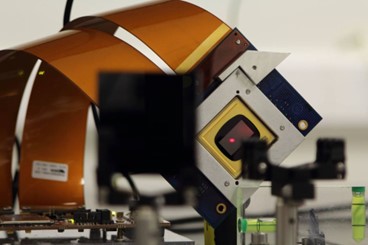Liverpool to Spearhead Advanced Beam Diagnostics in €10 Million PACRI Project

Photograph of a digital micro-mirror array, part of a high dynamic range beam profile, halo and emittance measurement system.
The University of Liverpool is set to play a key role in the recently funded €10 million PACRI project, which aims to revolutionize plasma accelerator technologies for next-generation research infrastructures. PACRI, short for Plasma Accelerator Systems for Compact Research Infrastructures, is supported under the European Commission’s HORIZON-INFRA-2024 programme. The project brings together 19 universities and international research laboratories, alongside 7 industrial partners, to address challenges in developing compact, efficient, and sustainable particle accelerators.
Liverpool will receive almost half a million Euro of the total funding to support cutting-edge research in advanced beam diagnostics, as well as project-wide communication and dissemination activities. This work will contribute directly to PACRI’s goal of overcoming technical barriers in plasma acceleration, including increasing repetition rates and improving system efficiency. The University’s efforts will be led by Professor Carsten P Welsch, a globally recognized expert in accelerator science.
The PACRI project focuses on three main research areas: high-repetition-rate plasma modules, advanced RF linear accelerator technologies, and high-power laser systems. By achieving breakthroughs in these fields, PACRI aims to reduce the size, cost, and environmental impact of accelerators, enabling their use in diverse applications such as medical imaging, materials diagnostics, and even compact colliders.
At Liverpool, the primary focus will be on developing advanced beam diagnostics tools capable of characterizing high-repetition-rate plasma accelerator beams with unprecedented precision. The team will design and test virtual diagnostic systems that leverage artificial intelligence for real-time machine control and optimization. These tools are expected to enable measurements of crucial parameters such as 4D emittance, beam coupling, and energy spread, which are vital for achieving high beam quality.
Additionally, Liverpool researchers will support the dissemination of PACRI’s findings through public engagement and communication strategies aimed at showcasing the societal benefits of plasma-based accelerators.
“PACRI represents a transformative step in accelerator technology, and we are thrilled to be part of this ambitious project,” said Professor Welsch. “Our expertise in beam diagnostics will play a crucial role in advancing plasma acceleration to the next level, and we look forward to collaborating with leading research institutions across Europe.”
The PACRI project is closely linked with two major European research infrastructures: EuPRAXIA and ELI-ERIC. EuPRAXIA, included in the ESFRI Roadmap in 2021, aims to deliver a plasma-based accelerator facility, providing a smaller and more sustainable alternative to traditional accelerators. Liverpool’s work in PACRI aligns with these goals by addressing diagnostic challenges and promoting broader access to plasma acceleration technologies.
By advancing the frontiers of accelerator science, PACRI will pave the way for more compact, energy-efficient solutions that meet the needs of scientific, medical, and industrial users alike. Liverpool’s involvement underscores the University’s commitment to driving innovation in this critical field, reinforcing its position as a leader in accelerator science.
The PACRI project will officially kick off on 1 March 2025.